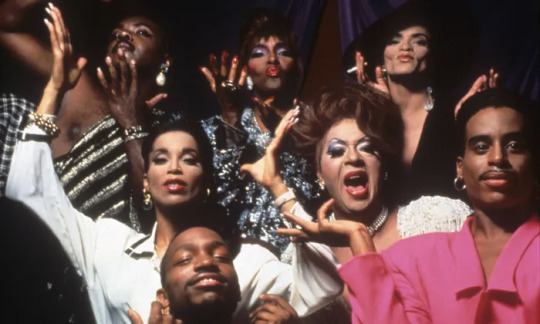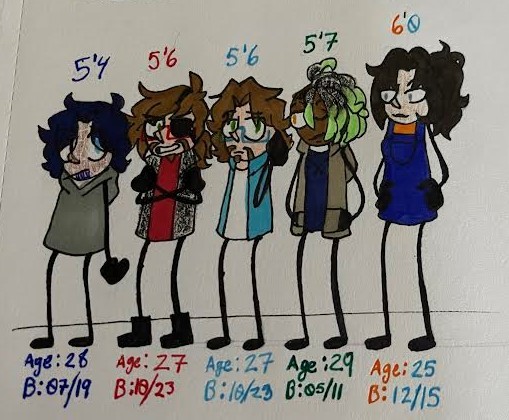#Latino 56
Explore tagged Tumblr posts
Text
Leoni Torres se vuelve tendencia gracias a video de Victoria y David Beckham bailando salsa
Victoria Beckham y David Beckham son dos celebridades que han dejado a muchos sorprendidos al compartir en redes sociales un video donde se les puede ver recibiendo clases de salsa con una canción de Leoni Torres. El tema se llama “Idilio” y es uno de los éxitos del cantante cubano. El video se hizo viral rápidamente, y muchas personas lo compartieron y comentaron en redes sociales. Incluso el…

View On WordPress
#ASCAP#Canten - Homenaje a Polo Montañez#David Beckham#éxito#Idilio#Latin grammy#Latino 56#Leoni Torres#Musica#Salsa#Traidora#Victoria Beckham#Video
0 notes
Text




Tarantula takes over the Latinos United gang to protect the kids in it and Bruce has batgirl tell her he wants a merge with Orpheus’s Hill gang to happen. Tarantula refuses and says she’ll keep them off the street her way. Batman accepts and Cass warns tarantula that Gotham can be rough on girls who think they can take it on alone (Gotham Knights #56)
19 notes
·
View notes
Text

David Rowe
* * * * *
LETTERS FROM AN AMERICAN
October 31, 2024
Heather Cox Richardson
Nov 01, 2024
House speaker Mike Johnson (R-LA) has responded to news stories about his plan to get rid of the Affordable Care Act (or Obamacare) by claiming his comments at the closed-door campaign event on Monday were taken out of context. But they weren’t. The tape is clear. Johnson said that Republicans want “massive reform�� to the Affordable Care Act, also known as “Obamacare.” When an attendee asked, “No Obamacare?” Johnson laughed and agreed: “No Obamacare. The ACA is so deeply ingrained, we need massive reform to make this work, and we got a lot of ideas on how to do that.”
MAGA Utah senator Mike Lee reposted the video of Johnson and commented: “Kill Obamacare now[.]”
Trump today posted on social media that he never mentioned repealing the Affordable Care Act, “never even thought of such a thing.” But this was either a memory lapse or a lie, because in 2016 he ran on repealing the ACA and his 2016 platform called for “a full repeal of Obamacare.” Within hours of taking office in 2017, Trump issued an executive order weakening the law, and when the Republican-dominated House voted to repeal the law, Trump held a celebration in the Rose Garden and declared the ACA “essentially dead.”
Senator John McCain (R-AZ) bucked Trump to protect the ACA then, and Trump began this year’s campaign with a promise to get rid of it before backing off. Even still, the vague promise in the 2024 platform to “increase Transparency, promote Choice and Competition, and expand access to new Affordable Healthcare” sounds a lot like Johnson’s promise to restore “the free market” to health care.
While Democratic nominee Vice President Kamala Harris has been campaigning in the swing states of Wisconsin and Pennsylvania, Trump today held a rally in Albuquerque, New Mexico, a state President Joe Biden won by almost 11 points in 2020 and that Democrats are likely to win in 2024. Trump had to hold the rally at a private airplane hangar after city officials refused to rent the Albuquerque Convention Center to the campaign because it still owes Albuquerque almost $445,000 from a similar rally in 2019.
Once there, he made it clear he was trying to repair some of the damage caused by the extraordinary racism and sexism on display at his Sunday rally at New York City’s Madison Square Garden, where a comedian called Puerto Rico “a floating island of garbage.”
Courting offended voters, he said: “Don’t make me waste a whole damn half a day here, OK? Look, I came here. We can be nice to each other, or we can talk turkey. I’m here for one simple reason: I like you very much, and it’s good for my credentials with the Hispanic or Latino community.” That outreach might not be enough to bring back the voters lost after the Madison Square Garden event.
The campaign is seeing other weaknesses, as well. Meredith McGraw and Jessica Piper of Politico reported today that nearly half of the ballots already cast in Pennsylvania have come from voters over the age of 65, and although the numbers of registered older voters are divided evenly between the parties, registered Democrats have made up about 58% of Pennsylvania’s early votes, compared to 35% for Republicans. Those numbers might well simply reflect different approaches to mail-in ballots, but they also might explain why Trump is already claiming fraud in Pennsylvania.
He is also seemingly nervous about Pennsylvania because women are voting there at a much higher rate than men in the early vote: 56% to 43%. And Democratic women are the biggest group of new voters in the state. New voters who were too young eight years ago to hear the Access Hollywood tape, in which Trump bragged about sexually assaulting women, have been hearing it on TikTok lately, as younger users record their reactions to it and call out their older male relatives for voting for anyone who would talk as Trump did.
“I moved on her, and I failed,” Trump says in the tape. “I’ll admit it. I did try and f*ck her…. I moved on her like a b*tch, but I couldn’t get there, and she was married,” Trump said. “You know I’m automatically attracted to beautiful— I just start kissing them. It’s like a magnet. Just kiss. I don’t even wait. And when you’re a star, they let you do it. You can do anything. Grab ‘em by the p*ssy. You can do anything,” he said.
The Harris campaign and pro-Harris organizations leaned into the history of women’s suffrage today with videos highlighting those who fought so that women could vote and reiterating: “We are not going back.” To assist those women who might not feel safe letting their husbands know how they voted, women have been posting notes in women’s public bathrooms assuring other women that their vote is secret. A Democratic advertisement voiced by actress Julia Roberts powerfully makes the point that women do not have to tell their husbands how they vote.
Right-wing figures like Charlie Kirk have expressed alarm at the gender gap in voting. As well, there has been a right-wing backlash to the idea that women will vote for Harris while letting their husbands assume they’re voting for Trump.
Former House speaker Newt Gingrich (R-GA), who famously cheated on both of his first two wives, expressed dismay at the idea that a woman might need to keep her vote secret from her husband. “For them to tell people to lie is just one further example of the depth of their corruption,” he said. “How do you run a country…saying wives should lie to their husbands, husbands should lie to their wives? I mean, what kind of a totally amoral, corrupt, sick system have the Democrats developed?”
On the Fox News Channel’s The Five this morning, host Jesse Watters said that if he found out his wife “was going into the voting booth and pulling the lever for Harris, that’s the same thing as having an affair…. That violates the sanctity of our marriage.” Christian pastor Dale Partridge posted: “In a Christian marriage, a wife should vote according to her husband’s direction. He is the head and they are one. Unity extends to politics. This is not controversial.” But, he added, “submission does have limits. A wife doesn’t need to submit to her husband in sin (in this case voting democrat).”
Tonight, at an event with right-wing host Tucker Carlson in Glendale, Arizona, Trump seemed to move beyond misogyny to murderous intent. He turned his increasingly violent rhetoric against former representative Liz Cheney (R-WY), who has urged Republican women to vote against Trump. “She’s a radical war hawk,” he said, “Let’s put her with a rifle standing there with nine barrels shooting at her, OK? Let’s see how she feels about it, you know, when the guns are trained on her face.”
Carlson is friendly with authoritarian Hungarian prime minister Viktor Orbán, who has undermined democracy in his own country and is close to Russian president Vladimir Putin. Today Orbán posted that he had “Just got off the phone with President [Trump]. I wished him the best of luck for next Tuesday. Only five days to go. Fingers crossed[.]“
Meanwhile, a lot more major endorsements for Harris have been coming in.
Today basketball legend LeBron James released a powerful one-minute ad with clips of Trump’s many racist statements and drawing a straight line from him back to the most violent days of the civil rights movement. “HATE TAKES US BACK,” it says. In a post sharing the video, James wrote: “When I think about my kids and my family and how they will grow up, the choice is clear to me. VOTE KAMALA HARRIS!!!” James has 53 million followers on X.
The Economist today endorsed Harris, warning that “a second Trump term comes with unacceptable risks.” Former New York City mayor Mike Bloomberg also posted on social media that he had voted for Harris “without hesitation,” and added that he hoped undecided voters would join him. “Trump is not fit for high office,” he wrote in a Bloomberg op-ed. He praised Harris’s positive vision and bipartisan outreach.
Conservative judge J. Michael Luttig published an op-ed in the New York Times on Tuesday, titled: “My Fellow Republicans, It’s Time to Say ‘Enough’ With Trump.” The former president is unfit for office, Luttig wrote. “When we entrusted our Constitution and our democracy to him before, he betrayed us.” Luttig assured readers that “[t]here could be no higher duty of American citizenship than to decisively repudiate” Trump.
He reminded his fellow Republicans that they had always “proudly claimed they would be the first to put the country above all else when the time came. That time has come…. All Americans, but especially Republicans, will live with their decision the rest of their lives.” “The choice for America next Tuesday,” Luttig wrote, “could not be clearer.”
Ever since Vice President Harris tapped Minnesota governor Tim Walz as her running mate, Democratic governors have been demonstrating their support for one of their own. Today, for Halloween, Democratic governors Wes Moore of Maryland, Janet Mills of Maine, Maura Healey of Massachusetts, Gretchen Whitmer of Michigan, and Phil Murphy of New Jersey each dressed to match a photograph of Walz.
“No tricks this Halloween!” Whitmer posted. “Just dressing up as our friend [Tim Walz]—excited to elect him and [Kamala Harris]. If you haven’t yet, make a plan to vote: http://iwillvote.com[.]”
LETTERS FROM AN AMERICAN
HEATHER COX RICHARDSON
#Heather Cox Richardson#Letters From An American#David Rowe#political cartoons#political#Mike Johnson#Affordable Care Act#Obamacare#women's rights#human rights#Women subordinate to their husbands#vote#voting rights#election 2024#Liz Cheney#murderous intent
15 notes
·
View notes
Text
First the good news: Over time, as an election gets closer, polls often come into greater alignment in measuring the preferences of important subgroups in the electorate. The bad news: Most national polls may have large enough samples to offer real information on the standing of candidates overall, but they rarely include enough respondents to provide reliable information on key constituencies. This does not stop analysts from picking up on what seem to be dramatic subgroup findings and using them to offer sweeping conclusions, even if the results are based on a remarkably small number of interviews.
My Brookings colleague Gabriel Sanchez made this point about polling of Latino voters in a pair of articles published in May. His conclusion is right and important:
Most national polls are designed to provide a snapshot of the full electorate’s attitudes, voting preferences, policy priorities, and enthusiasm levels at this stage in the campaign season. Reputable polls do a good job of meeting this goal. However, these national samples are not designed to capture variation within sub-samples of the larger electorate, including Latino voters. Consequently, many national polls either suffer from a low sample size of Latino voters and/or a sub-sample of Latinos that is not designed to be nationally representative of that population.
The same is true for another hugely important 2024 voter group: the young. Voters under 30 (or, as some polls measure the young, under 35) are closely watched because to win these days, Democratic candidates need big margins among the young—and also need them to turn out in substantial numbers. Partly because our electoral system better fits the needs of older than of younger voters—the young tend to be more mobile and thus need to re-register more often—young people usually (though not always) cast ballots at lower rates than the older voters.
Start with the problem of measuring the preferences of young people. In early September, the New York Times/Siena poll and the Pew Research Center’s poll were released within a day of each other and covered roughly the same polling period. The Times/Sienna survey was conducted from September 3 to September 6; Pew from August 26 to September 2. They produced very similar topline results. Among registered voters, Times/Sienna showed Trump up by two points among registered voters while Pew had the race tied. But their findings for young voters were widely divergent, as the chart here shows. In the Times/Sienna poll, Harris led Trump by just one point, 47% to 46%, among voters under 30. In the Pew Poll, Harris overwhelmed Trump among the under 30s by 29 points—63% to 34%. This pattern of wide divergence was not confined to these two surveys, but it was particularly striking given the similarity of their overall numbers.
Over the course of September, the two surveys came more closely into line with each other, with Pew’s earlier measurement of Harris’ advantage among young people looking closer to an accurate estimate. In late September/early October, polling over very nearly the same interview period, Times/Sienna gave Harris a 58% to 37% lead among the young; Pew registered a 57% to 34% Harris youth advantage. This is broadly in line with other surveys during the month, including the gold standard Harvard Institute of Politics Poll, based on a large sample focused only on young people. Similarly, a Yale University youth poll released in mid-October showed Harris ahead among under 30s, 56% to 35%.
To get accurate readings of the preferences of important subgroups, Democratic pollster Anna Greenberg recommends surveys directed to that purpose.
“Generally, stand-alone polls of hard-to-reach groups are better because they are designed specifically to reach them and better reflect the diversity of these groups,” Greenberg said, referring specifically to polls of young voters and Latino voters. Young people, she said, “are less likely to answer the phone and take surveys than older voters and new methods like SMS [Short Message Service] polls do not do better with younger people.”
Younger voters are also more racially diverse than other generations and increasingly polarized along gender lines. In a relatively small subgroup sample, differences between the precise type of young people that a given poll reaches can thus add up to produce strongly divergent results.
Whit Ayres, a Republican pollster, said that to make their polls representative, pollsters sometimes use quota methods to cover race, gender, and education levels. However, other subgroups are not included in such quotas. “I suspect if you weighted these age cohorts by gender and education, they would be closer” to each other, Ayres added.
The bottom line: As a national poll is broken down into smaller and smaller subgroups, numbers from those groups are increasingly less reliable.
If measuring young people’s preferences is hard, figuring out their turnout rates—and, as importantly, which younger people will actually cast a ballot—is even more difficult. And exactly who among the young votes could matter enormously. This finding from a Pew survey conducted in late September and early October brought home the importance of differential turnout between supporters of the two major candidates.
“As in 2020, voters under age 30 are the least likely to say they are motivated to vote: 40% of voters in this age group say they are extremely motivated to vote,” Pew found. “And Trump supporters under 30 are less likely than young Harris backers to be highly motivated to vote (34% to 50%, respectively).” If this motivational difference holds up between now and election day, Harris could outperform even accurate measures of the preferences of the under 30s.
Young voters were critical to Democratic victories in 2018, 2020, and 2022. They could prove to be just as important in 2024. So, analysts will continue to watch their behavior closely. The best advice, offered recently by Ezra Klein in the New York Times and Eugene Robinson in the Washington Post, is for everyone to stop obsessing over day-to-day changes in the polling. But since most political junkies will ignore this counsel, they should at least avoid cherry-picking subgroup results that seem most startling or confirm their prefabricated assumptions. Comparing many surveys of subgroups before reaching large conclusions—and keeping a close eye on who is most likely to cast a ballot—provides a path to wisdom, and lower blood pressure.

11 notes
·
View notes
Text
youtube
Join us for an inspiring conversation with Nely Galán, an Emmy Award-winning producer and media mogul, as she shares her journey of business success and financial literacy. Nely discusses her experience as an immigrant and how her determination and strategic decision-making skills led her to become a self-made businesswoman. Learn about her time working with industry giants like HBO, Avon, CBS, ESPN, Sony, NBC, FOX, and figures such as Joan Rivers, Rupert Murdoch, Norman Lear, and Gene Simmons. This video is packed with valuable insights on entrepreneurship, business leadership, and overcoming obstacles. Nely Galán offers practical tips on how to start your own business, manage risk, and develop entrepreneurial skills. Whether you're looking to enhance your career development, improve your business strategy, or find inspiration from success stories, this video has it all. Nely Galán has achieved substantial success in real estate by focusing on strategic property investments. Her philosophy, encapsulated in the phrase "Don't buy shoes, buy buildings," emphasizes the importance of purchasing affordable properties, especially in emerging markets. Nely also emphasizes the importance of networking, calculated risk-taking, and financial literacy in achieving business success. Discover her unique "Nelyism" approach and gain knowledge from one of the most inspiring women in leadership today. Perfect for anyone interested in business, entrepreneurship, and Latina empowerment.
DISCLAIMER: The following program contains material, situations, and/or themes that may disturb some viewers. Viewer discretion is advised.
A National CORE Production supporting the Hope Through Housing Foundation. Join us to uncover the art of turning dreams into reality.
CHAPTERS: 00:00: How Latino Entrepreneurs Overcome Financial Obstacles 02:42: The Road to Financial Freedom 04:30: How I Became a Young Journalist 07:30: Defying Expectations 12:32: The Hidden Value of Education 15:40: How to Prioritize What Matters 18:49: Failure Isn't the End 22:11: Find Your Voice 24:56: Overcoming Self-Doubt and Limiting Beliefs 27:29: How I Rebooted My Life and Found True Success 34:21: A Message of Empowerment and Inspiration
12 notes
·
View notes
Text
Looking at the exit poll demographics tells one hell of a story about how things are shifting. A few takeaways:


Young men are significantly more conservative than young women, and notably more conservative than they were in 2020, where Biden earned 56% of the youngest male demographic's vote. However, young women's support also fell ten percent, and a third-party shift doesn't account for this drastic fall. Young people overall are shifting conservative, so what happened to Gen Z being the beacon of progressive values?


Harris outperformed Trump in virtually every single age group except those aged 50-64, and for the first time in a long while, the oldest age group turned blue, just barely.

Racially, some things held as per usual. Black women continue to lead with 92% voting for Harris. Black men supported Harris slightly less than Biden, and significantly less than Clinton. However, Latino men turned out in droves to vote for Trump this year compared to 2020.



And the education divide continues to be a chasm. Is it any wonder Republicans are gutting education nationwide?

I will continue to study these statistics as more roll in.
3 notes
·
View notes
Text
⚜️ 𝟭𝟯 𝗗𝗜𝗖𝗘𝗠𝗕𝗥𝗘 𝟭𝟮𝟱𝟬:
⠀⠀⠀⠀⠀⠀⠀𝗔𝗗𝗗𝗜𝗢 𝗔 𝗙𝗘𝗗𝗘𝗥𝗜𝗖𝗢 𝗜𝗜
⠀⠀⠀⠀⠀⠀ 𝗦𝗧𝗨𝗣𝗢𝗥𝗘 𝗗𝗘𝗟 𝗠𝗢𝗡𝗗𝗢 ⚜️
Pochi avanzi di mura sul dorso di una collina invasa dalle sterpaglie. È quel che oggi resta di 𝗖𝗮𝘀���𝗲𝗹 𝗙𝗶𝗼𝗿𝗲𝗻𝘁𝗶𝗻𝗼, una rocca che nella prima metà del XIII secolo sorgeva nelle campagne della Capitanata, 9km a sud di Torremaggiore, a ovest di San Severo e Lucera.
Qui, nel giorno dell’anno con meno luce, il 𝟭𝟯 𝗗𝗶𝗰𝗲𝗺𝗯𝗿𝗲 𝗱𝗲𝗹 𝟭𝟮𝟱𝟬, festa di Santa Lucia, a soli 56 anni, morì 𝙁𝙚𝙙𝙚𝙧𝙞𝙘𝙤 𝙄𝙄 𝙙𝙞 𝙎𝙫𝙚𝙫𝙞𝙖.
La mattina del 13 Dicembre (secondo una cronaca agiografica) l’Imperatore volle indossare l’umile tonaca grigia dei cistercensi del terzo ordine di cui faceva parte. Chiese di essere sepolto nella cattedrale di Palermo, accanto al padre e alla madre.
Ma l’annuncio della morte, forse per ordine dello stesso Federico, venne tenuto nascosto per un certo tempo. Fino al Gennaio del 1251 la cancelleria emanò dispacci e documenti come se l’imperatore fosse ancora vivo.
Il giovane Manfredi comunicò la scomparsa al fratellastro Corrado per lettera, con parole accorate:
“𝙏𝙧𝙖𝙢𝙤𝙣𝙩𝙖𝙩𝙤 𝙚' 𝙞𝙡 𝙨𝙤𝙡𝙚 𝙙𝙚𝙡 𝙢𝙤𝙣𝙙𝙤 𝙘𝙝𝙚 𝙧𝙞𝙡𝙪𝙘𝙚𝙫𝙖 𝙞𝙣 𝙢𝙚𝙯𝙯𝙤 𝙖𝙡𝙡𝙚 𝙜𝙚𝙣𝙩𝙞”
Il cadavere, con ogni probabilità, fu imbalsamato. Il 28 dicembre il corteo con il feretro dell’imperatore attraversò per l’ultima volta le città di Foggia, Canosa, Barletta e Trani e gli altri centri della costa. A Bitonto, Matteo di Giovinazzo notò “sei compagnie de cavalli armati” e “alcuni baroni vestiti nigri insembra (insieme) co’ li Sindaci de le Terre de lo Riame”. A Taranto la salma fu imbarcata per la Sicilia.
⠀⠀𝘾𝙚𝙣𝙩𝙞𝙣𝙖𝙞𝙖 𝙙𝙞 𝙫𝙖𝙨𝙘𝙚𝙡𝙡𝙞, 𝙥𝙞𝙘𝙘𝙤𝙡𝙞 𝙚 𝙜𝙧𝙖𝙣𝙙𝙞, 𝙨𝙖𝙡𝙪𝙩𝙖𝙧𝙤𝙣𝙤 𝙞𝙡 𝙛𝙚𝙧𝙚𝙩𝙧𝙤 𝙘𝙤𝙣 𝙙𝙧𝙖𝙥𝙥𝙞 𝙣𝙚𝙧𝙞.
Così Federico tornò a Palermo, la città dell’infanzia e della giovinezza, che 38 anni prima aveva lasciato per affrontare la straordinaria avventura che lo portò a diventare prima re di Germania e poi imperatore.
La salma dell’imperatore fu tumulata nel Duomo, accanto ai genitori e alla prima moglie Costanza, in un maestoso sarcofago di porfido color amaranto.
Carismatico e scomodo. Colto e spietato. Feroce eppure tollerante. Federico parlava sei lingue (latino, siciliano, tedesco, francese, greco e arabo). Diventò adulto in una società multirazziale. Comprese e studiò il pensiero islamico. Si appassionò alla scienza e alla poesia. A Napoli fondò una grande università che porta ancora il suo nome. Fu curioso del mondo e degli uomini: alla sua corte trovarono alloggio intellettuali di ogni lingua e religione.
Con le “𝗖𝗼𝘀𝘁𝗶𝘁𝘂𝘇𝗶𝗼𝗻𝗶 𝗠𝗲𝗹𝗳𝗶𝘁𝗮𝗻𝗲” (1231), raccolta di norme fondata sul diritto romano e normanno, Federico sognò di dare ordine, a scapito della Chiesa e dei nobili, a tutti gli aspetti dello Stato, dalla giustizia alla sanità, fino al diritto e all’economia.
Federico mise in discussione, dalle fondamenta, il potere temporale dei pontefici. Tornò vincitore da una crociata alla quale era stato obbligato, senza combattere nemmeno una battaglia.
L’Impero finì con la sua morte. In appena venti anni la dinastia degli Hohenstaufen si estinse
.

11 notes
·
View notes
Text

Título casique de la junta
nombre Diomedes Díaz maestre
padres Rafael María Díaz y Elvira maestre
más conocida como mamá vila
edad:56
nació 26 de mayo 1957
cuántos hijos tuvo : HIJOS RECONOCIDO 21
Nombre de los hijos: MARTÍN ELIAS, RAFAEL DIAZ,ROSA ELVIRA DIAZ,FREDY JOSE DIAZ, MOISES DIAZ LUIS ANGEL DIAZ DIIMEDES DE JESUS DIAZ, DIOMEDES DIOMISIO DIAZ, RAFAEL MARIA DIAZ ,MIGUEL ANGEL DIAZ KELLY ELVIRA DIAZ MARIA ALEXANDRADIAZ MACARENA ROCIO DIAZ RAFAEL SANTOS BETSY LILIANA JOSE MIGUEL LYIS MARIANO DIAZ KATIUSKA Y CARMEN CONSUELO DIAZ
fue un cantante vallenato muy reconocido a nivel mundial entre sus canciones
más reconocidas amarte más no puede sin medir distancia oye mujer bonita mi primera cana el condor herido
Apodo:el cacique de la junta.en el 2010 fue ganador de un grammy latino en la categoría cumbia vallenato con el álbum musical listo pala foto
Falleció el22 de diciembre 2013 de un infarto
3 notes
·
View notes
Text
Paris Is Burning
Continuing my series of learning about things referenced in the book, I'm looking at things Alex references when he talks about engaging with queer history. These are all tagged #a series of learning about things that are referenced in the book, if you want to block the tag.
Please note the following topics are metioned: murder, AIDS - and death due to complications, sexual violence, sex work, racism, queerphobia.

Paris is Burning is a documentary film, released in 1990, that focuses on the 1980s ball culture of Harlem (New York) and the communities of gay & transgender African-American &Latino people involved in that culture. It offers an exploration of race, class, gender, and sexuality in the US at that point in time. The AIDS crisis was growing in severity, and impacted many of the people involved with the documentary. Many of them have since died due to AIDS complications - including Angie Xtravaganza (age 28), Dorian Corey (age 56), and Willi Ninja (age 45).
Documentarian Jennie Livingston interviewed key figures in the ball world, and the film features monologues from many of which addresses their understanding of gender roles, subcultures of both the ball world and the queer world, as well as sharing their own life stories. It also provides an introduction to slang terms used within the subculture, such as house, mother, shade & reading. Interspersed with this is footage of colourful ballroom performances. The documentary also looks at how AIDS, racism, poverty, violence, and homophobia impacts their lives. Some of those involved became sex workers to support themselves, at great risk to their safety - one member is found strangled to death, seemingly by a client. The 'Houses' of the ball culture provide safety and security to those disowned by queerphobic parents, as well as those largely ostracised by mainstream society.
The documentary did have some criticisms - notably for reinforcing stereotypes, having a white filmmaker, and for not properly providing compensation - but it has remained important as a depiction of ball culture, the most prominent display until Drag Race began to popularise the concept to a wider audience.
-----
Ball culture - also known as the Ballroom Scene/Community, Ballroom Culture or just Ballroom - takes its origins from a series of drag balls, including those organised by William Dorsey Swann (the first person known to self-describe as a drag queen) in Washington DC, during the late 1800s. These drag balls were masquerade themed and took place to defy laws which banned people from wearing clothes of the opposite gender. Many early attendees were formerly enslaved men, and the events were held in secret. While balls were integrated during a time of racial segregation, non-white performers regularly experienced racism from the white judges and performers. This prompted Black and Latino performers to create their own spaces within the subculture, and the modern culture grew out from Harlem in the late 1960s, spreading to other major cities soon after.
The structural and cultural issues facing the community in 1980s New York - including poverty, racism, homophobia, as well as sexual violence and AIDS - didn't stop Ballroom from thriving, acting not only as an escape from real life but also offering those involved a support system that was not often present in other areas of their lives. The culture included a system of 'Houses' - headed by an elder queer person (although often not much older than those in the family), either a 'mother' (mostly gay men or trans women) or a 'father' (mostly gay men or trans men) - which would become a surrogate family for young queer Black and Latino youth who were estranged from family, homeless, and/or struggling to get by. House members would often take on the surname of their house parent, and the houses would compete together in balls - often with a specific style identifiable as belonging to that group.
Drag ball culture works to resist the dominant cultural norms people experience from wider society. The performers create a space to challenge gender roles and heteronormativity through subversive outfits, slang, and actions. It gives them a space to feel supported and to work through their abuse they experienced as members of minority groups.
The balls not only provide a community, but also provide spaces for education. Aware of the prevelence of AIDS and the lack of support, in 1990 the Gay Men's Health Crisis (GMHC) launched the Latex Ball to distribute health information to those involved in ball culture. Offering free HIV testing and prevention materials, it attracts thousands of people from around the world and is still active to this day.
-----
The importance of Paris is Burning continues to grow as the years pass. It was a rare film that focused on the lives of queer people of colour, whose charisma and humanity shines through in their witty to-camera interviews and their fierce routines and performances.[source]
Sources: Wikipedia - Paris is Burning Guardian - Burning down the house: why the debate over Paris is Burning rages on Vanity Fair (archived) - Paris Is Burning Is Back—And So Is Its Baggage Janus films - Paris is Burning Wikipedia - Ball Culture Rolling Stone - Striking a ‘Pose’: A Brief History of Ball Culture All Gay Long - A Brief History of Modern Ballroom Culture Shondaland - The Psychological and Political Power of Ball Culture
Additional Reading: Paris is Burning, 1990
#elio's#elio's meta#a series of learning about things that are referenced in the book#long post#alt text added#rwrb#red white and royal blue
18 notes
·
View notes
Text
D.U.D.E Bios: Hortensia Marino
Urbano's Wife Hortensia Marino (2020)

The wife of Urbano, sister-in-law of Bienvenida and daughter-in-law of Yago and Florencia, Hortensia. She works as a bartender and pole dancer, as well as a part-time wrestler.
"I get more bruises than my husband does at work."
Name
Full Legal Name: Hortensia Zoraida Marino (Née Lozano)
First Name: Hortensia
Meaning: Feminine form of the Roman family name 'Hortensius', possibly derived from Latin 'Hortus' meaning 'Garden'.
Pronunciation: or-TEHN-sya
Origin: Ancient Roman, Spanish
Middle Name: Zoraida
Meaning: Perhaps means 'Enchanting' or 'Dawn' in Arabic.
Pronunciation: so-RIE-dha
Origin: Spanish
Surname: Marino (Née Lozano)
Meaning: Derived from the given name 'Marino' which itself is the Italian and Spanish form of 'Marinus', 'Marinus' comes from the Latin word 'Marinus' meaning 'Of the sea'. (Lozano: Means 'Healthy, Exuberant, Lively' in Spanish.)
Pronunciation: ma-REE-no (lo-SA-no)
Origin: Spanish (Spanish)
Alias: Miracle
Reason: Work name & Ring Name
Nicknames: Sia, Zora, Raida
Titles: Mrs, Ms
Characteristics
Age: 35
Gender: Female. She/Her Pronouns
Race: Human
Nationality: Cuban
Ethnicity: Hispanic/Latino
Birth Date: July 10th 1985
Symbols: None
Sexuality: Bisexual
Religion: Catholic
Native Language: Spanish
Spoken Languages: Spanish, English, Portuguese, Italian
Relationship Status: Married
Astrological Sign: Cancer
Theme Song (Ringtone on Billie's Phone): 'Pony' - Ginuwine
Voice Actor: Anabelle Acosta
Geographical Characteristics
Birthplace: Bayamo, Granma Province, Cuba
Current Location: Bayamo, Granma Province, Cuba
Hometown: Bayamo, Granma Province, Cuba
Appearance
Height: 5'7" / 170
Weight: 150 lbs / 68 kg
Eye Colour: Brown
Hair Colour: Black
Hair Dye: None
Body Hair: N/A
Facial Hair: N/A
Tattoos: (As of Jan 2020) 4
Piercings: Ear Lobes (Both)
Scars: None
Health and Fitness
Allergies: None
Alcoholic, Smoker, Drug User: Social Drinker
Illnesses/Disorders: None
Medications: None
Any Specific Diet: None
Relationships
Allies: N/A
Enemies: N/A
Friends: Wanda Ott, Genesis Winter, Rosaleem O'Sullivan, Oneida Rhydderch, Haf McFarlane, Olwen McDermott, Gertrude Rhydderch, Llinos McConnell
Colleagues: N/A
Rivals: N/A
Closest Confidant: Urbano Marino
Mentor: Hilaria Lozano
Significant Other: Urbano Marino (34, Husband)
Previous Partners: None of Note
Parents: Ramiro Lozano (55, Father), Hilaria Lozano (56, Mother, Née Nieddu)
Parents-In-Law: Yago Marino (57, Father-In-Law), Florencia Marino (58, Mother-In-Law, Née Palomo)
Siblings: Iris Nicci (32, Sister, Née Lozano), Jazmín Lozano (29, Sister), Luna Lozano (26, Sister)
Siblings-In-Law: Sancho Nicci (33, Iris' Husband), Bienvenida Marino (37, Urbano's Sister), Judith Ibarra (31, Urbano's Sister, Née Marino), Xavier Ibarra (32, Judith's Husband), Quirino Marino (28, Urbano's Brother), Natividad Marino (25, Urbano's Sister), Macario Marino (22, Urbano's Brother), Rosaura Marino (19, Urbano's Sister), Isaac Marino (16, Urbano's Brother)
Nieces & Nephews: Emperatriz Romero-Marino (17, Niece), Antonio Huerta-Marino (14, Nephew), Triana Santos-Marino (11, Niece), Casilda Ibarra (11, Niece), Zaira Nicchi (12, Niece)
Children: Lorenzo Marino (14, Son), Paz Marino (11, Daughter)
Children-In-Law: None
Grandkids: None
Great Grandkids: None
Wrestling
Billed From: The Underworld
Trainer: Sabas Marino, Yago Marino, Tercero Marino, Ramiro Marino, Pastor Marino, Olegario Marino, Nicanor Marino, Jair Marino, Heliodoro Marino, Gonzalo Marino, Facundo Marino, C.R.C Wrestling School
Managers: Urbano Marino
Wrestlers Managed: Urbano Marino
Debut: 2005
Debut Match: Miracle VS Oneida Rhydderch. Miracle won via pinfall
Retired: N/A
Retirement Match: N/A
Wrestling Style: Grappler
Stables: Los Marinos (2006-)
Teams: Los Marinos
Regular Moves: Big Boot, Diving Clothesline, Swinging Neckbreaker, Diving Crossbody, Sitout Rear Mat Slam, Electric Chair Drop, Electric Chair Facebuster, Flapjack, Half Nelson Bulldog, Inverted DDT, Missile Dropkick, Spinning Heel Kick, Somersault Senton Plancha, Sharpshooter, Sitout Powerbomb, Crossface, Spinebuster
Finishers: Leg Hook Reverse STO, Spear, Lifting DDT, Standing Arm Triangle
Refers To Fans As: The Watchful Eyes
Extras
Trivia: Nothing of note
#D.U.D.E#original character#Marino#Lozano#Los Marinos#C.R.C Wrestling School#C.R.C Wrestling Promotion
4 notes
·
View notes
Text
Li Zhou at Vox:
A massive gender gap has been evident in poll after poll of this election — a significant trend that underscores the pivotal role women could play this November. Most recently, a late October Quinnipiac survey of Michigan found 57 percent of women in the state back Vice President Kamala Harris, while 40 percent of men did the same. Conversely, 56 percent of men backed former President Donald Trump, while 37 percent of women did. That’s repeatedly been the case in national polls, too. For example, a recent poll from USA Today/Suffolk University found that Harris had a 16-point gap in the support that she saw from men and women.
“It’s the battle of the sexes, and it’s no game,” Quinnipiac pollster Tim Malloy said in a statement. “There is a glaring gap in Michigan and Wisconsin between the number of women supporting Harris and the number of men supporting Trump.” In Quinnipiac polls conducted in five of the seven key swing states throughout October, Harris had a significant lead among women, while Trump saw a comparable advantage among men in those same places. (Quinnipiac has not released October results for Nevada and Arizona.) Women supporting Democrats over Republicans isn’t a new phenomenon: Members of the group have been more likely to support the party than men since the 1980s, and this political divide has only grown over time. This time around, though, that split could have major implications for the election outcome due both to how tight the race is, and other demographic shifts.
According to recent polls, Democrats seem to be losing support among groups they’ve counted on in the past, like Black men and Latino men. Those losses could be made up by boosting turnout among women, particularly since women are more likely to vote than men, and historically do so in larger numbers.
[...]
The gender gap is a sign of the inroads Democrats have made over time
Women have backed Democrats by a significant margin in multiple cycles now. In 2020, President Joe Biden won 55 percent of women voters, while Trump won 44 percent, and in 2016, former Secretary of State Hillary Clinton won 54 percent of women voters, while Trump won 39 percent, according to Pew Research Center. If the actual outcome approaches the figures that pollsters are seeing, Democrats could well maintain these margins.
Part of Democrats’ growth with women comes from ideological shifts: A higher proportion of women across all age groups are now identifying as liberal, compared to two decades ago, according to a Gallup survey published in February. And younger women between the ages of 18 to 29, especially, are one of the groups now far more likely to identify as liberal than they were in the past. Gallup found 40 percent of young women identified as liberal in 2023 compared to 29 percent in 1999. While the left is adding women, it’s gaining few men, however. In that same 24-year timeframe, Gallup found the proportion of men who identify as liberal across age groups has stayed relatively unchanged: Just 25 percent of young men identified as liberal in 2023, only 1 percentage point more than in 1999. Women’s leftward shift has been driven by a combination of factors, including opposition to misogynistic rhetoric from GOP leaders and allegations of sexual misconduct faced by prominent political figures — like Trump, who’s the subject of more than 20 accusations of sexual assault and misconduct, including a new allegation this week.
Polling in the 2024 Presidential Election has featured a massive gender gap, with women favoring Democratic nominee Kamala Harris and men favoring Republican former “President” nominee Donald Trump.
#Gender Gap#Donald Trump#Kamala Harris#Gender#2024 Presidential Election#2024 Elections#Women#Men#Polls#2024 Election Polls
3 notes
·
View notes
Text
HC TIME! (+small casual au i made in 5 minutes)

Gordon Freeman (He/Him, Bisexual)
-Older than Felix by 56 minutes and 45 seconds
-Mom passed away when he was 5
-Was left with his dad and his brother, and his dad wasn't the most loving guy
-Despite being twins, Gordon always had more responsibility put on him by his dad than Felix, (even as an adult, which is why he's a substance abuser especially during work hours)
-Now as an adult, he works at Black Mesa where he was picked to help with a major secret test
-Having to deal with all the responsibility, bailing Felix out of trouble and being trusted with a shit load of work, he copes by having a massive ego, "I can handle whatever people decide to drop on me, I'm better and smarter than all of you" then breaks down at night
-Gordon has connections at Black Mesa and is chummy with the higher ups, no matter how snobby he thinks they are
-Realized he was bi a little before his 27th birthday, but he was raised with... A very old fashion way of thinking. (Hes over it now, he doesn't care who dates who except for himself, because... Guilt.)
-his dads death was a mixed bag of emotions, including guilt about who he is, but he doesn't like to talk about it
-Despite feeling guilt, it didn't stop him from dating a guy for a week before backing out and ghosting him.
-although Gordon cannot stand Felix sometimes, he still bails him out of trouble and he hangs out with him after work cause that's really the only person he has at this point (they watch movies or go out for beers)
-has mild paranoia
-Loves pirates, legit has a pirate costume he wears for fun
-sometimes he'll speak like a pirate to annoy Felix
-Gordon likes turtles for some reason, but he doesn't have time for pets right now
-loves sour food/candy, not much of a sweets person
(Causal AU)
The test went without really anything too bad, at the last second, someone turned the machine from 105% back to 100%, the portal didnt malfunction, however it still teleported Gordon to the area with the Vortigaunts and one attacked him, going straight for the face, knocking him over and damaging his eye and parts of his ear, once he teleports back he gets sent to the infirmary and Black Mesa is thrilled at the results Freeman was able to bring back, despite the cost of it.

Felix Freeman (He/Him, Demisexual, Pansexual)
-da younger twin
-has lived in Gordon's shadow basically his whole life (his dad paying more attention to Gordon, even if it was for negative reasons)
-this causes him to act out, even as an adult, getting in trouble at work (the job Gordon got him) by touching stuff he wasnt supposed to or taking things from work
-this, makes him look very childish
-his first week he met Barney and would have lunch with him, not telling him about his brother right away, not wanting to deal with comparisons
-Felix isn't much of a drinker but will go out for drinks with Barney or Gordon once in a while
-Felix is absolutely shit at video games shooter, but he still plays em with Barney sometimes
-is really into conspiracy theories, and especially loves aliens and the idea of alien life in space, he shares this love with Chell
-not much of a pet person but he thinks dogs are cool, mostly Chihuahua's cause Gordon hates them
-he almost set his kitchen on fire once

Barney Calhoun (He/Him, Transmasc, Bisexual)
-Grew up in a Latino household but he still doesn't know Spanish.
-came out as trans at 16, his dad was accepting, his mom not so much. His dad is still learning so he gets stuff wrong sometimes
-he loves planes, he trained to be a pilot but Black Mesa rejected the position and instead offered him a job as a security guard, he half-heartedly accepted but he makes the most outta it.
-he thinks ninjas are really cool and used to have a ninja costume when he was 10
-he was diagnosed with ADHD when he turned 20
-when he was little he had a slight tooth gap, it was barely noticeable so he didn't think he needed braces and refused em, but as he got older the gap got worse and he hates the idea of braced
-he once snuck his switch into work. He got caught instantly.
-he carries his phone and earpods with him everywhere
-his playlist is mostly video games OST and fanmade songs
-definitely has a thing for Gordon (for some reason)
-Barney has interacted with Gordon many times and is under the impression they're on good terms, however, he just so happened to catch Gordon when he was either drunk or high, so Gordon has no idea who Barney is
-Loves lost media, he finds comfort in it no matter how dark it is
-looooves snacks, his favorite is spicy cheese popcorn
-Drinks monsters like it's water (someone help this man)
-hes saving up to adopt a cat
~~~
BONUS:

Chell Nanako (She/Her They/Them, Pansexual) (NOT CHELLS MIND, this is my own version of her)
-was in and out in a lot of foster homes until she was 18
-They didn't get the best education but saw an ad for paid test subjects for a science facility called Aperture Science.
-She met Felix who was applying for the same job, they talked and exchanged numbers in the waiting room. Felix wasn't willing to sign the contract that said Aperture couldn't be held accountable for any injury so the job went to Chell
-Chell moved in with Felix, and they dated for a 2 and a half weeks before Chell realized she wasn't ready for a relationship and Felix realized he barely knew Chell and didn't like them that way
-Chell still lives with Felix and they grow closer everyday
-She knows Aperture and Black Mesa are rivals and they finds it funny how she's not allowed in Black Mesa
-Due to the way she grew up, they have extreme paranoia and intrusive thoughts about other people, she's only really comfortable around Barney, Felix, and rarely Gordon.
-Chell doesn't really get along with Gordon
-Chell loves strawberry flavor sweets
-loves Mountain Dew and drinks it when she needs an energy boost
-They doesn't really like chocolate
-She loves sea creatures, her favorite is angel fish
(Casual AU)
Chell signed up for Aperture Science's test subjects, she was asleep for around 2 months and then the events of Portal 1 happened, but instead, Doug Rattman was able to save Chell from being dragged back into Aperture by the part escort bots and he took her to a nearby hospital, leaving before she woke up.

Eddie Marlowe (He/Him, Transmasc, Gay)
-Gordon's ex
-he is the "I know a guy" guy
-used to just have a business relationship with Gordon (selling him stuff, and somehow, a human skull) but they hung out and became friends... And then...
-Gordon one day broke up with Eddie after a week of dating and ghosted him, he got played dirty and he never found out why
-he's a college drop out and lives in an apartment
-frequently dyes his hair but his favorite color is green
-he has a hard drive full of pirated shows and movies
-he has a pet bird named Dazzy
-his parents don't know about his... "Job" and think he's a salesman, which is somewhat true
-Eddie isn't a snack person, he prefers big meals
-Eddie is a great cook
~~~
EXTRA BONUS:

Heights, current age, and birthdays! I wrote the birthdays weird my bad, it was 1 am
Barney: July 19th - Gordon & Felix: October 23rd - Eddie: May 11th - Chell: December 15th
#freemans mind#gordon freemind#half life barney#barney calhoun#barneys mind#barmey calhoun#buttermind#felixs mind#felix freeman#felix freemind#chell#chell portal#woag#hell yeah i love mischaracterization#this took a looooong time to get out my bad#:3#notshelbyuwu#half life
18 notes
·
View notes
Photo







Manu Chao - ...Próxima Estación... Esperanza. Año 2001. Edición Francia. Reedición 2013. Latin. Because Music.
Es el segundo álbum de estudio como solista del cantautor franco/español Manu Chao publicado el 4 de junio de 2001.
Dentro de los temas tratados por Manu Chao en este disco destacan la pérdida de la tierra, el amor, la doble moral y los problemas sociales que de esta se derivan, la marihuana, entre otros, que pese a ser temas melancólicos, tienen un aire más positivo que su álbum anterior Clandestino.
La música es una mezcla ecléctica de diversos ritmos latinos como la salsa, el calipso, jazz de cabaret, reggae y una cantidad infinita de pequeñas piezas de cuñas de radio y televisión.
El álbum se considera como el trabajo más conocido y vendido del artista, y uno de los discos más importantes en habla hispana. El sencillo Me Gustas Tú, es a su vez el más exitoso del músico y su canción más conocida.
En 2010 fue mencionado en el puesto #65 por la revista Rolling Stone en el ranking Mejores álbumes de la década.6 En 2012, el álbum aparece en el #474 en la lista de Los 500 mejores álbumes de todos los tiempos tmabién por Rolling Stone.
- Manu Chao: música y letras.
Producción Manu Chao - productor y diseño. Renaud Letang - productor. Frank Loriou - diseño.
Tracklist:
A1 Merry Blues 3:36 A2 Bixo 1:52 A3 Eldorado 1997 1:29 A4 Promiscuity 1:35 A5 La Primavera 1:52 A6 Me Gustas Tu 3:59
B1 Denia 4:39 B2 Mi Vida 2:32 B3 Trapped By Love 1:54 B4 Le Rendez Vous 1:56
C1 Mr. Bobby 3:49 C2 Papito 2:51 C3 La Chinita 1:33 C4 La Marea 2:16
D1 Homens 3:18 D2 La Vacaloca 2:23 D3 Infinita Tristeza 3:56
#musiccollection#coleccióndemúsica#vinilos#viniloschile#viniloslp#sharemusic#compartirmúsica#lp#vinylrecords#latin#manuchao
3 notes
·
View notes
Text
I don't agree with all of the points or comments here, but I do think there's some interesting stuff to think about
Editor's note: In 2024, just as in 2016 and 2020, Trump won big among working-class white evangelicals but lost majorities of blue-collar blacks, Latinos, and non-evangelical whites. A less than 1% shift in the “blue wall” states would have tipped the Electoral College to Harris, and a less than 1% shift nationally would have given her the popular vote as well. Looking ahead to 2026 and 2028, Democrats remain well-positioned to advance pro-worker/pro-family policies, appeal to diverse working-class constituencies, and win elections at all levels of government.
The dominant post-election 2024 narrative is that Donald Trump’s victory over Kamala Harris was delivered largely by a multiracial working-class coalition. Backed by certain numbers, this narrative has many Democrats quaking in their 2026 campaign boots. For example, the exit polls show that working-class voters, defined as voters without a college degree, split 56% for Trump to 42% for Harris. The same polls tell us that white working-class voters favored Trump over Harris by 66% to 32%, and that Trump won a larger share of working-class Black and Latino voters than he did in 2020.
All true, but let’s put those numbers into historical context and then, starting with the white working class, dig into what the exit poll data reveal when you run cross-tabulations by education and sex.1
As I have documented elsewhere, after winning a 56% white working-class majority in 1984 with Ronald Reagan, the GOP lost the majority in the 1990s, then got back to even with George W. Bush in 2000 (50%) and again in 2004 (51%). Mitt Romney won 56% of the white working-class vote in 2012, followed by Trump with 62% in 2016, 59% in 2020, and 66% in 2024. That two-thirds share is impressive, but many other Republican candidates have done as well or better electorally with the white working class.
For example, in 2022, working-class whites broke 66% for Republican congressional candidates—the same percentage of those voters that Trump won in 2024. And several Republican governors who were not aligned with Trump won more than two-thirds of white working-class votes. For example, in 2022, Florida’s Ron DeSantis, who would go on to challenge Trump for the GOP presidential nomination before becoming his staunch ally, won 70% of the white working-class vote; and Ohio’s Mike DeWine, who received a congratulatory call from President Joe Biden the morning after his reelection win, received 72% of it.
How they voted
The white working-class electorate consists of two distinct voting blocs: white evangelicals without college degrees and all other whites without college degrees. The latter bloc, which encompasses working-class white catholics and other non-evangelical whites without college degrees, is slightly larger than the former bloc.
As I have documented elsewhere, in 2016 and 2020, Trump won a majority of white evangelical working-class voters, but he lost a majority of white non-evangelical working-class voters. He lost them again in 2024.
Take a look at Tables 1 and 2. In 2024, Trump won 86% of white evangelical working-class voters, up from 84% in 2020, and increased his spread with those voters by 5 points (from plus-68 points versus Biden to plus 73-points versus Harris). But he still lost white non-evangelical working-class voters to Harris, 52% to 45%, even as he reduced his losing margin with this bloc by 8 points (from 15 points behind Biden to 7 points behind Harris).


Among white non-evangelical working-class women, Trump did worse in 2024 than he did in 2020, dropping from 40% to 38% of their vote and widening the spread against him by 3 points.
Now, take a look at Table 3 below. In 2024, Trump lost Black working-class voters by 72 points, 13% to 85% for Harris. That was slightly better than the 77-point spread (11% to 88%) he suffered against Biden in 2020. He won 22% of Black working-class males, up from the 17% he won against Biden. Meanwhile, Black working-class women gave Harris the same 91% of their vote that they gave Biden, and they reduced their Trump vote from 9% in 2020 to 7% in 2024.

But if Democrats are determined to fret and sweat about where they stand with working-class voters, the exit poll data would justify them worrying—not about some pro-Trump or pro-GOP multiracial working-class coalition, but about Latino voters.
Take a look at Table 4 below. Although Trump lost working-class Latinos to Harris by 51% to 47%, that was 31 points fewer than he lost them to Biden in 2020. He won Latino working-class men 55% to 43%, almost exactly the same split in his favor that he had among non-evangelical white working-class males (52% to 44%). And while he again lost working-class Latino women, he lost them by 24 points fewer than he did against Biden in 2020.

Among Latinos, the only subgroup that did not bolt from the Democratic fold was college-educated Latino women, who favored Harris 63% to 33%, a 30-point margin identical to the one they gave Biden in 2020.
But Trump’s victory in 2024, his more than 76 million votes and his swing-states sweep, is owed the most to white evangelicals. White evangelicals voted for Trump more than four to one, constituting more than a third of his 49.9% share of the popular vote. As Table 1 indicates, Trump was a landslide winner among working-class white evangelicals, but his single biggest gain in 2024 over 2020 was among white evangelical women with college degrees.
Having suffered a double-digit drop in college-educated white evangelical women’s vote between 2016 and 2020, in 2024 he turned a 6-point spread in Trump’s favor against Biden (53% to 47%) into a 50-point spread in his favor against Harris (74% to 24%).
So, in the 2024 election, a majority of white evangelicals without college degrees once again favored Trump, but majorities of blue-collar Black, Latino, and non-evangelical whites did not.
But why? And why did Trump do better than ever with college-educated white evangelical women? What was behind the Grand Canyon-sized gender gap in voting? More generally, how much can who voted for president and who didn’t, or who voted how for president, or both, be explained by, say, “culture” or “religion” or “ideology,” whether in conjunction with or separate and apart from each other and other variables?
Pro-worker/pro-family Democrats
At this stage—in fact, at any stage—it’s really hard to say. As one of the pioneering scholars of American national election studies, Donald E. Stokes, and I explained three decades ago in our analysis of the 1992 presidential election results, in deciding on which candidate or party to support, most voters consult their own ideas, ideals, and interests, and then take into account both where they think the respective contenders stand on specific issues (abortion, immigration, transgender rights, etc.) and how they perceive each contender’s possession of traits that are almost universally considered to be laudable (“intelligent,” “trustworthy,” “care about people like me”) or loathsome (“incompetent,” “corrupt,” “callous”).
Still, I believe that there are at least three things one can credibly say about the 2024 presidential election results at this stage. First, as we have already established, contrary to so much of the commentary, Trump won a vast majority of white evangelical voters without college degrees, but Harris won majorities among blue-collar Blacks, Latinos, and non-evangelical whites; second, Harris did better with the electorate as a whole than has hitherto generally been acknowledged; and, third, it would seem that, other things equal, Democrats who emphasize pro-worker/pro-family policies and messages do better with voters than otherwise comparable Democrats who don’t.
Despite being the first Black woman to run for president as the nominee of a major party; despite running in place of a highly unpopular first-term sitting president whose record she could neither easily run on nor run from; and despite running what many observers judged to be a tactically mistake-ridden campaign yoked to easy-to-attack anti-majority opinion positions on hot-button issues such as transgender women being allowed to compete on women’s teams in sports; Harris won more than 74.3 million votes, constituting 48.3% of the national popular vote to Trump’s 49.9%; and lost Pennsylvania by 1.7%, Wisconsin by 0.8%, and Michigan by 1.4%.
So, a less than 0.8% shift her way in the national popular vote would have tied Trump’s tally, and a less than 1% shift her way in the three “blue wall” states would have added 44 electoral votes to the 226 she received and made Harris the next president.
In addition to winning working-class majorities among non-evangelical whites, Blacks, and Latinos, Harris beat Trump among union workers 57% to 41%. As I have explained elsewhere, most Americans now see the decline in private-sector unionization (from about a third of all workers in the mid-20th century to 17% in the mid-1980s to just 6% now) as bad for America; 70% of working-class Americans approve of unions; and an estimated 60 million nonunionized workers would like to have the opportunity to join a union.
Indeed, Americans now trust organized labor more than large technology companies and big business. Moreover, growing evidence suggests that increasing the availability of union-quality jobs—meaning presumptively secure jobs with decent wages, working conditions, health insurance, and retirement benefits—would increase birth rates and foster stable family formation.
So, as close as Harris came to winning, might she have done even better had she picked Pennsylvania Governor Josh Shapiro, a popular (60% plus approval rating), pro-worker/pro-family, center-left Democrat, as her running mate? There are many reasons to think so. For one, Shapiro-allied Democrats retained control of Pennsylvania’s State House, including wins by pro-worker/pro-family, center-left candidates in counties that Trump carried.
Harris herself might have donned that pro-worker/pro-family mantle, as she was vice president in an administration that protected the U.S. steel and shipbuilding industries by tripling tariffs on Chinese imports; banned non-compete clauses that stop workers from taking a job in their same line of work if they quit; expanded eligibility for overtime pay; and pressured pension funds to invest in firms that have fair labor practices and divest from ones that treat workers poorly.
Harris’ running mate, Minnesota Governor Tim Walz, though hapless as a national campaigner, championed pro-worker/pro-family laws. One such law provided workers partial pay for up to 12 weeks a year to care for a newborn baby, nurse a sick relative, or recover from a serious injury or medical malady. Another eliminated hyper-productivity requirements that certain companies inflict on warehouse workers and drivers.
As the saying goes, the plural of anecdote is not data; but I have, in effect, 67 years’ worth of “time series data” on blue-collar voters in Pennsylvania, New Jersey, and Delaware. These states are home to my predominantly working-class family members and lifelong friends, including baby boomers who became “Reagan Democrats” or changed their registration to Republican. They affectionately (for the most part) code me, “the professor,” as a “liberal,” though I consider myself to be a center-left/center-right (depending on the issue) pro-life/pro-poor Democrat in the tradition of the late, great Keystone State Governor Bob Casey.
Most of them voted for Barack Obama in 2008, Mitt Romney in 2012, and Trump in 2016. They split between Biden and Trump in 2020, but went uniformly (save one), if in many cases reluctantly, for Trump in 2024. My informal “focus group” polling suggests that Harris could have won at least a quarter of them had she spotlighted pro-worker/pro-family policies.
As the journalist Batya Ungar-Sargon has rightly noted, working-class voters hold nuanced views on most issues. For example, most working-class people would not consider getting an abortion but strongly oppose banning abortion; most don’t want to expand the welfare state but do want government-guaranteed health insurance; most favor secure borders but oppose immigration bans; and so on. And, as economist Les Leopold has argued, the median working-class voter remains ideologically center-right. Still, over the last decade, working-class views have trended to the left on many social and cultural issues, including abortion, LGBTQ rights, and taxation.
Democrats are well-used to losing white evangelical voters but are new to losing Latino voters. It’s not clear what, if anything, Democrats could do to court white evangelical voters. Ever more of the party’s faithful profess no religious faith, are affiliated with no religion, and identify as strictly secular. But Democrats can begin to build a bridge back to the Latino voters who they lost in 2024 by promoting expressly pro-worker/pro-family candidates and policies like those favored by organizations such as the Pennsylvania Latino Convention, Esperanza, and most of the more than one million Latinos who live, work, and vote in Pennsylvania.
If confirmed, Trump’s nominee for Labor Secretary, Lori Chavez-DeRemer, a Republican House member from Oregon, would be the most pro-union Republican to hold that position since John T. Dunlop held it under President Gerald Ford. Last July, Chavez-DeRemer, a Latina, co-sponsored a bill that called for the biggest expansion in workers’ rights since the New Deal.
Over the next two to four years, whatever else they do, will Democrats double-down on pro-worker/pro-family policies, and will Republicans launch new pro-worker/pro-family policies of their own?
Let’s all hope so, because if the two parties compete for Latinos and other voters that way, then all Americans, most especially all working-class Americans, will stand to benefit lots.
6 notes
·
View notes
Note
Goku's an honorary Latino, Luffy and Shanks are honorary French (at least according to my research) Piccolo is an honorary Black Muslim ... I think Shinji should be an honorary Slav just to keep things interesting.
Its specifically SBS 56 of One Piece where Oda says Luffy would be Brazilian I think? Same lil blurb where he said Nami would be Swedish and stuff. I personally think Shanks should be Scottish given the nordic influence of his ship and the Gaelic origin of his name, plus I like to think he has a broadsword with a basket hilt hehehe
4 notes
·
View notes
Text
We aren't doing this bullshit again. There's a specific age group that Trump appeals to and even they came out in numbers for Harris.
White women OVER 45 are the main voters for trump.
The difference between Trump and Harris was 53% vs 46% in this group. Previously Trump had a 11% lead with this group. This year its only ~8%.
Harris has a 56% white woman aged 18-45 vote.
The thing that fucked Harris the most is the Latino vote because Latinos are now leaning toward the republican party by 12%. Previously it was 23% for democrats.
So you can't say Harris lost the vote because of white women when a demographic that was 20+% democrat now votes in favor of Republicans by 12% and white women's vote for democrats INCREASED.
everyone keeps talking about men being radicalized etc etc but no one mentioning the elephant in the room that majority of white women voted for trump too
11K notes
·
View notes